
IWD 2016: Super women of Africa
By Brenda Wawa and Johnson Siamachira
For International Women’s Day 2016, CIMMYT and MAIZE celebrate women farmers in Africa, who through their resilience, bravery and commitment have weathered challenges in maize farming to put food on the table. These women contribute to enhancing agricultural growth and food security.
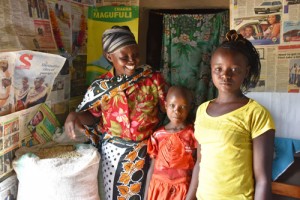
Photographer: CIMMYT/Brenda Wawa
Valeria Pantaleo
Valeria Pantaleo a wife and mother of four from Olkalili village in Hai district a semi-arid area in northern Tanzania (about 600 kilometers from Dar es Salaam), grew a healthy HB513 maize harvest. The improved hybrid maize variety gave her a surplus of four 50-kilogram bags of maize She had enough maize to feed her family for the next six months – until the next planting season. She was also able to sell the excess crop and buy a calf that would help her plow her land. The calf will replace her two oxen that died at the beginning of the year, and help reduce the labor burden for her and her two daughters who would help plow the land. Read more about Valeria here
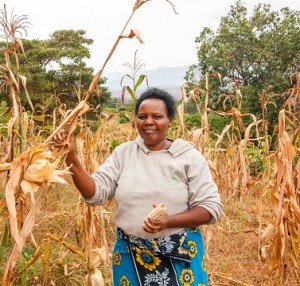
Sarah Nyamae
Harsh climatic conditions left Sarah Nyamae disillusioned. She did not take maize farming very seriously, although maize is a staple food in her home. The local varieties she often planted could not withstand the periods of drought common in the eastern region of Kenya where Nyamae and her family live. Her decision to an improved maize variety led to a doubled yield of three bags of 50 kilograms. The good harvest from the KDV4 seed she planted led her to increase the size of her growing area on her small farm to plant more maize. Furthermore, she began educating her neighbors about the benefit of planting improved drought-tolerant maize varieties for a bigger and better yield. Read more about Nyamae here.
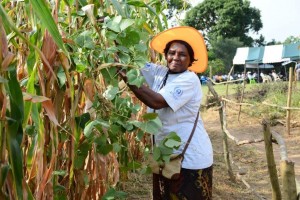
Angeline Odero
Agricultural training helped Angeline Odero, a smallholder farmer from Boro Community in Central Alego Ward, Siaya County in western Kenya; learn first-hand benefits of improved technology aimed at easing drudgery and tedium. Previously, she spent many hours undertaking exhausting hand-weeding but with the SIMLESA project, everything changed. Through the use of herbicide, Angeline doubled her maize yield to five tonnes per hectare. The increase in yield translated into increased gross margins from less than US$5,000 per hectare up to $6,500-8,000 per hectare. With the herbicide, she reduced the cost of weeding from $160 per hectare using hired labor and traditional weeding practices to less than $60 per hectare. Find out more about Odero here.
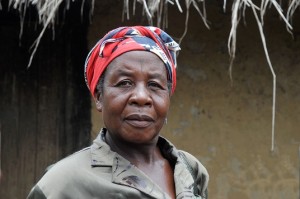
Belita Maleko
Belita Maleko hails from Mwansambo extension planning area, the rural Nkhotakota Zone in central Malawi. Widowed 20 years ago, Maleko has used conservation agriculture to fight hunger and poverty in her community. Her zeal to adopt conservation agriculture practices in 2006 translated to labor and cost savings, improved soil structure and fertility, increased infiltration and water retention, lessening erosion and water run-off. These practices contributed to adaptation to the negative effects of climate variability and change. Maleko has been using maize-grain legume (cowpea and soybean) rotations. As a result of the good yields, Maleko has paid school fees for her children, improved her homestead and attained food security for her family. Find out more about Maleko here.
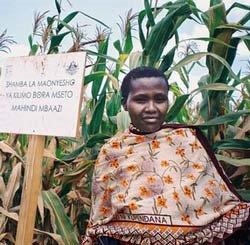
Felista Mateo
Felista Mateo, a smallholder farmer from Kilima Tembo Village in Tanzania, lived off subsistence maize farming for many years. The traditional agricultural methods she used resulted in low harvests and income. After she separated from her husband, she was left to fend for their children as a single parent. Her father gave her farmland and she embraced new conservation agriculture technology, which changed her life and the lives of her children too. By planting hybrid maize seed together with a tasty, early-maturing variety of pigeon pea unseen previously in the area, she harvested enough to feed her children and had surplus to sell. Mateo accessed pigeon pea exports markets in India through bulk marketing with other Tanzanian farmers and through the support of the SIMLESA project. Find out more about Mateo here.
This article was originally posted on www.cimmyt.org
Africa, drought tolerance, gender, Kenya, Maize, Malawi, Tanzania
